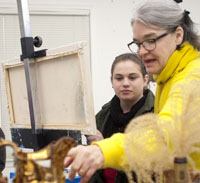Legacy Society Renamed to Honor Dr. Quillian, Former College President

Dr. William F. Quillian, Jr. was president of Randolph-Macon Woman's College for 26 years.
Randolph College has renamed one of its giving societies in memory of William F. Quillian, Jr., the College's fifth and longest-serving president.
The Legacy Society, which recognizes individuals who have included the College in their estate plans, has been renamed the Quillian Society. Randolph College President Bradley W. Bateman announced the change during a donor recognition event at the 2014 Reunion for alumnae and alumni. Dr. Quillian's wife, Margaret Quillian, and his daughter, Anne Quillian, were present at the announcement. Anne presented Bateman with the yellow doctoral tam that members of the Class of 1959 gave to her father upon their graduation.
Quillian, who died on March 4, led the College for 26 years and oversaw significant changes such as campus expansion and racial integration of the student body. "Upon his retirement, Dr. Quillian took on an even more active role in the Lynchburg community," Bateman said. Quillian was co-founder and executive director of the Greater Lynchburg Community Trust, which administers and invests gifts and bequests to benefit people living in the Lynchburg area. He also was the force behind the founding of the Lynchburg chapter of Leave A Legacy, a nonprofit that encourages people to include charitable causes in their wills.
Understanding the importance of estate gifts through his work in the community, Dr. and Mrs. Quillian embraced the idea of leaving a lasting legacy by establishing a charitable remainder unitrust with Randolph College, thus joining the membership of the Legacy Society themselves in 2000. A longtime supporter of the Randolph College Annual Fund, Dr. Quillian also named Randolph College as a beneficiary of his estate with a gift to the Annual Fund.

